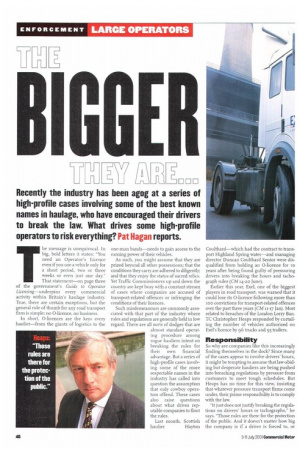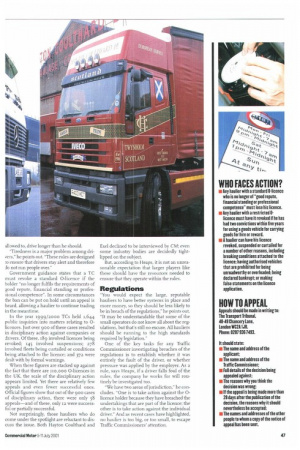GGE
Page 46

Page 47

If you've noticed an error in this article please click here to report it so we can fix it.
Recently the industry has been agog at a series of high-profile cases involving some of the best known names in haulage, who have encouraged their drivers to break the law. What drives some high-profile operators to risk everything? Pat Hagan reports.
The message is unequivocal. In big, bold letters it states: "You need an Operator's Licence even if you use a vehicle only for a short period, two or three weeks or even just one day." That statement—on page three of the government's Guide to Operator Licensing—underpins every commercial activity within Britain's haulage industry. True, there are certain exceptions, but the general rule of thumb for any road transport firm is simple: no 0-licence, no business.
In short, 0-licences are the keys every haulier—from the giants of logistics to the one-man bands—needs to gain access to the earning power of their vehicles.
As such, you might assume that they are prized beyond all other possessions; that the conditions they carry are adhered to diligently: and that they enjoy the status of sacred relics. Yet Traffic Commissioners up and down the country are kept busy with a constant stream of cases where companies are accused of transport-related offences or infringing the conditions of their licences.
Such misdemeanours are commonly associated with that part of the industry where rules and regulations are generally held in low regard. There are all sorts of dodges that are almost standard operating procedure among rogue hauliers intent on breaking the rules for their own financial advantage. But a series of high-profile cases involving some of the more respectable names in the industry has called into question the assumption that only cowboy operators offend. These cases also raise questions about what drives reputable companies to flout the rules.
Last month, Scottish haulier Hayton
Coulthard—which had the contract to transport Highland Spring water—and managing director Duncan Coulthard Senior were disqualified from holding an 0-licence for to years after being found guilty of pressuring drivers into breaking the hours and tachograph rules (CM 14-20 rune). Earlier this year, Exel, one of the biggest players in road transport, was warned that it could lose its 0-licence following more than ion convictions for transport-related offences over the past three years (CM 11-17 Jan). Most related to breaches of the London Lony Ban. TC Christopher Heaps responded by curtailing the number of vehicles authorised on Exel's licence by 96 trucks and 95 trailers.
Responsibility
So why are companies like this increasingly finding themselves in the dock? Since many of the cases appear to involve drivers' hours, it might be tempting to assume that law-abiding but desperate hauliers are being pushed into breaching regulations by pressure from customers to meet tough schedules. But Heaps has no time for this view, insisting that whatever pressure transport firms come under, their prime responsibility is to comply with the law.
'It just does not justify breaking the regulations on drivers' hours or tachographs," he says. "Those rules are there for the protection of the public. And it doesn't matter how big the company is if a driver is forced to, or
allowed to, drive longer than he should.
"Tiredness is a major problem among driers," he points out. 'These rules are designed to ensure that drivers stay alert and therefore do not run people over."
Government guidance states that a IC must revoke a standard 0-licence if the holder "no longer fulfils the requirements of good repute, financial standing or professional competence". In some circumstances the ban can be put on hold until an appeal is heard, allowing a haulier to continue trading in the meantime.
In the year 1999/2000 TCs held 1,644 public inquiries into matters relating to 0licences. Just over 900 of these cases resulted in disciplinary action against companies or drivers. Of these, 189 involved licences being revoked; 145 involved suspensions; 278 involved fleets being curtailed or conditions being attached to the licence; and 372 were dealt with by formal warnings.
When these figures are stacked up against the fact that there are ir 0,000 0-licences in the UK, the scale of the disciplinary action appears limited. Yet there are relatively few appeals and even fewer successful ones. Official figures show that out of the goo cases of disciplinary action, there were only 58 appeals—and of these, only 12 were successful or partially successful.
Not surprisingly, those hauliers who do come under the spotlight are reluctant to discuss the issue, Both Hayton Coulthard and Exel declined to be interviewed by CM; even some industry bodies are decidedly tightlipped on the subject.
But, according to Heaps, it is not an unreasonable expectation that larger players like these should have the resources needed to ensure that they operate within the rules.
Regulations
"You would expect the large, reputable hauliers to have better systems in place and more money, so they should be less likely to be in breach of the regulations," he points out. "It may be understandable that some of the small operators do not know all about the regulations, but that's still no excuse. All hauliers should be running to the high standards required by legislation."
One of the key tasks for any Traffic Commissioner investigating breaches of the regulations is to establish whether it was entirely the fault of the driver, or whether pressure was applied by the employer. As a rule, says Heaps, if a driver falls foul of the rules, the company he works for will routinely be investigated too.
"We have two areas ofjurisdiction," he concludes. "One is to take action against the 0licence holder because they have breached the undertakings that are part of the licence; the other is to take action against the individual driver." And as recent cases have highlighted, no haulier is too big, or too small, to escape Traffic Commissioners' attention.












































































































